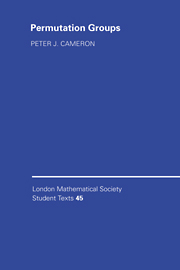2 - Representation theory
Published online by Cambridge University Press: 06 January 2010
Summary
Historical note
The first edition of Burnside's Theory of Groups of Finite Order was published one hundred years ago; it was the first book on group theory in English. In the preface, Burnside explained his decision to treat permutation representations but not matrix representations as follows:
It may then be asked why, in a book which professes to leave all applications on one side, a considerable space is devoted to substitution groups [permutation groups]; while other particular modes of representation, such as groups of linear transformations, are not even referred to. My answer to this question is that while, in the present state of our knowledge, many results in the pure theory are arrived at most readily by dealing with properties of substitution groups, it would be difficult to find a result that could be most directly obtained by the consideration of groups of linear transformations.
However, in 1911, when the second edition appeared, he wrote,
Very considerable advances in the theory of groups of finite order have been made since the appearance of the first edition of this book. In particular the theory of groups of linear substitutions has been the subject of numerous and important investigations by several writers; and the reason given in the original preface for omitting any account of it no longer holds good.
The ‘several writers’ referred to are most notably Frobenius, Schur, and Burnside himself.
- Type
- Chapter
- Information
- Permutation Groups , pp. 35 - 62Publisher: Cambridge University PressPrint publication year: 1999



